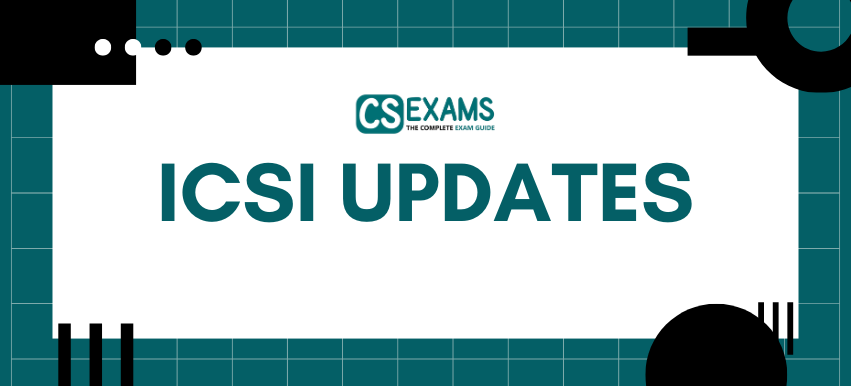To make a career as a company secretary (CS) in India, a clear understanding of the eligibility criteria set by the ICSI is required. In 2026, the path remains well-structured: Start with CSEET until you give discounts, proceed through the executive level, and finally proceed to the professional stage. Each infection has its own timeline, academician, and procedural requirements, which the aspiration should plan and ensure.
ICSI has established the company secretary eligibility criteria for 2026, which cover educational prerequisites, career advancement, and important admission exams. Check the Executive and Professional Program's CS Eligibility Requirements here.
CS Foundation eligibility requires completing the Class 12 boards. CS Executive is open to students who have finished CS Foundation. In addition, students who have graduated may apply for the position of CS Executive. Students who have finished the CS Executive can proceed to the CS Professional.
Company Secretary Course Details
There are three stages in the company secretary program. The initial stage is CS Foundation, then comes the stage of CS Executive, and then there is CS Professional. Any one of them has to be passed to be eligible as a company secretary.
| Parameters | For CS Foundation | For CS Executive | For CS Professional |
| Course Level | First | Second | Third |
| Course Duration | 8 months | 9 months | 15 months |
| Eligibility | Passed 10+2 in any stream (except Fine Arts) | After graduation or Post-graduation (except Fine Arts), one should have either cleared CS Foundation or CSEET | After qualifying for the CS Executive Exam |
| No. of Subjects | 4 subjects | 8 subjects (in two modules, with 4 subjects in each module) | 9 subjects (in three modules, with 3 subjects in each module) |
| Exam | Twice a year (June and December) | Twice a year (June and December) | Twice a year (June and December) |
| Course Fee | INR 4500 | INR 10600 to INR 15600 | INR 12000 |
| Exam Fee | INR 1200 | INR 1200 for each module | INR 1200 for each module |
| Top Institute for CS course | The Institute of Company Secretaries of India (ICSI) | The Institute of Company Secretaries of India (ICSI) | The Institute of Company Secretaries of India (ICSI) |
CS Foundation Eligibility Criteria 2026
All the candidates applying for admission to the CS Foundation course are under the following conditions.
- A recognized board/university should have passed its 10+2 or similar examination with a minimum of 50% total marks.
- Students who are seen in Grade 10+2 are eligible for the ICSI CS Foundation program, but they need to show proof, like their exam roll number.
CS Executive Eligibility Criteria 2026
All the candidates applying for admission to the CS Executive Course are eligible if they fall under the following.
- Candidates must have scored more than 40% in each subject of the CS Foundation Examination.
- Candidates with a bachelor's degree can apply directly to the CS Executive Course.
- The age of the candidates should be at least 17 years.
- Candidates who have passed the CSEET can also apply for the CS Executive Course.
CS Professional Eligibility Criteria 2026
All the candidates applying for admission to the CS professional course are eligible if they fall under the following.
- The candidate has to pass both modules in the CS executive examinations with the minimum passing score set by ICSI.
- Currently, to be eligible for the CS Executive Examination, candidates will have to score between 40% and 50% in each subject.
Company Secretary Requirements
The Company Secretary is one of the most difficult exams in India. It is for the position of company secretary. There are certain prerequisites to becoming a company secretary.
- Candidates must have passed their 10+2 from a known board with a minimum of 50%.
- The candidates must have cleared the CS Foundation Exam successfully.
- Aspirants must have cleared the CS Executive Exam successfully.
- The candidates should have cleared the CS Professional Exam successfully.
- Once they pass all three levels, the candidates must go through 15 months of on-the-job training.
- 15 days of training in an organization like the stock exchange, the Registrar of Companies office, a banking organization, or a financial organization.
- 15-day Management Skills Orientation Programme (MSOP)—once the professional program.
- The candidates shall have to finish 25 hours of the Professional Development Program (PDP).
- Once the CS Professional Program is cleared, the student can register as a licensed ICSI until training requirements are completed.
CS Exam Preparation Tips
Once you have completed the CS Eligibility Criteria 2026, it's time to prepare for the CS exam 2026. To prepare well for the CS exam, you must adhere to some tips and tricks that can assist you in achieving your goal. Here are some tips you can follow:
- Understand the Syllabus: Begin by reading the exam syllabus so that you know the main topics. Knowing what to cover will enable you to manage your study time effectively.
- Create a Study Plan: Plan your study timetable so that you cover all topics in a methodical way. Spend more time on difficult areas while making sure that you go through all subjects prior to the exam.
- Master the Basics: Good basic knowledge of programming concepts, data structures, and algorithms is fundamental. Practice from lecture notes, textbooks, and online tutorials to reinforce your concepts.
- Practice Coding Continuously: Practice coding problems on sites such as LeetCode, CodeChef, and HackerRank. This enhances problem-solving abilities and the ability to write efficient code within a stipulated time.
- Review Old Exam Papers: Practice questions from previous exams familiarize you with the question pattern and work on time management. Attempt them under simulated exam conditions for effective preparation.
- Participate in Group Discussions: Group study with fellow students can clarify doubts, offer diverse viewpoints, and support learning through discussion and solving problems.
Why Choose CS Exam Test Series for CS Preparation
When it comes to preparing for the hard CS exams, choosing the right test series can make all the difference. csexams.in has emerged as a trusted and result-oriented platform for CSEET, Executive, and Professional-level aspirants. Here's why it should be your first choice:
- Trusted by Thousands of CS Aspirants: The CS Exam has built a strong reputation among CS students for its consistent quality and excellent student feedback.
- ICSI Pattern-Based Question Papers: All tests are strictly based on the latest ICSI exam pattern and syllabus, ensuring real exam-like practice.
- Timely Evaluation with Expert Feedback: Get your answers evaluated within 48–72 hours along with detailed feedback, a marking scheme, and improvement tips.
- Personalized Mentorship & Study Planner: Get personalized mentorship, performance tracking, and a daily study plan customized to your syllabus completion pace.








